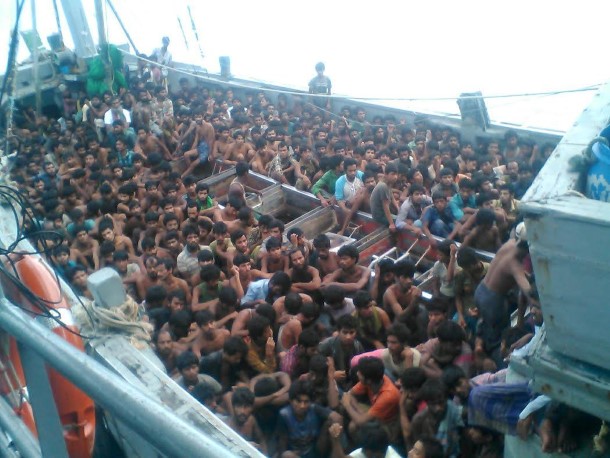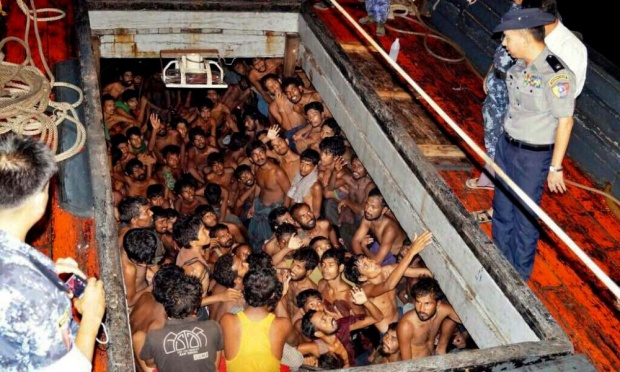Posts Tagged ‘Rohingya’ (311 found)
A Regional Solution to the Refugee Crisis Must Address Root Causes
 On 29 May 2015, Thailand hosted the long-awaited Special Meeting on Irregular Migration to address the unfolding refugee crisis in the Andaman Sea. The talks brought together representatives from 19 nations mainly in the ASEAN region, along with delegates from the UN High Commission for Refugees (UNHCR), UN Office on Drugs and Crime (UNODC), and the International Organization for Migration (IOM). At the time of the meeting, the Arakan Project has reported that at least 6,000 refugees, mainly Rohingya, are unaccounted for and likely stranded at sea. Victims of discrimination and denied even basic human rights back in Burma, these individuals are risking malnourishment, dehydration, and abuse in order to escape repressed lives under the Burma Government.
On 29 May 2015, Thailand hosted the long-awaited Special Meeting on Irregular Migration to address the unfolding refugee crisis in the Andaman Sea. The talks brought together representatives from 19 nations mainly in the ASEAN region, along with delegates from the UN High Commission for Refugees (UNHCR), UN Office on Drugs and Crime (UNODC), and the International Organization for Migration (IOM). At the time of the meeting, the Arakan Project has reported that at least 6,000 refugees, mainly Rohingya, are unaccounted for and likely stranded at sea. Victims of discrimination and denied even basic human rights back in Burma, these individuals are risking malnourishment, dehydration, and abuse in order to escape repressed lives under the Burma Government.
As more and more refugees are rescued from the squalid conditions at sea, survivor accounts have begun to emerge. Human Rights Watch recently published accounts that detail the dangerous journey from Burma, including stories involving traffickers intentionally abusing the refugees in order to hasten ransom demands, being forced at gunpoint into departing refugee boats, and the cramped and overcrowded conditions of the boats used to transport the refugees. A 16-year-old Rohingya girl described her experience on board the refugee boat, “When I got to the big boat … I cannot explain my feeling I was so scared. We were about 16 people in one small room. The doors were always locked. The smugglers put the food and water through a small hole, we never saw them.” […]
• • •Bangkok Meeting a Failure as Delegates Avoid Discussion of Issues in Regional Migrant Crisis
BANGKOK, 29 May — Parliamentarians from ASEAN member states, including Thailand, Malaysia, Indonesia and Myanmar expressed serious concern today after a meeting on irregular migration in Southeast Asia failed to address in any meaningful way the root causes of the region’s migrant crisis […]
• • •Responding To Boat People Crisis in Southeast Asia – Special Meeting in Bangkok Must Formulate a Long-Term and Sustainable Solution
(Bangkok, 28 May 2015) – On 29th May, 17 countries will come together in Bangkok for the “Special Meeting on Irregular Migration in the Indian Ocean” hosted by the Thai Government […]
• • •Southeast Asia: Put Rights at Center of Boat People Summit
(Bangkok, May 28, 2015) – Governments gathering in Bangkok on May 29, 2015, to discuss the Southeast Asia boat people crisis should reach binding agreements to save people at sea, permit them to disembark without conditions, and ensure unimpeded access for United Nations agencies to protect the rights of asylum seekers, Human Rights Watch said today […]
• • •South East Asia: ‘Boat People’ Crisis Summit an Opportunity that must not be Missed
Regional governments must take immediate action to save lives and address the root causes of the South East Asian refugees and migrant crisis, Amnesty International said ahead of a key summit in Thailand on Friday […]
• • •UN Security Council Must Agree Concrete Action on Rohingya Crisis
Burma Campaign UK welcomes the discussion on Burma and the Rohingya due to take place at the United Nations Security Council today […]
• • •APHR Condemn Myanmar Population Control Law as another Step towards Ethnic Cleansing
JAKARTA, 27 May 2015 – The Myanmar government’s passage of a controversial new “population control” law is yet another in a long line of restrictive and illegal measures as part of a policy of persecution and ethnic cleansing of the Rohingya population, ASEAN lawmakers said today […]
• • •Anti-Muslim Activities in Burma
This report prepared based on the information received from a Burma based monitoring network. The report mainly focused on the activities of anti Muslim Buddhist extremist groups and anti Muslim political parties such as Race and Faith Defence League (RFDL), Myanmar National Network (MNN), Peace and Diversity Party (PDP) and other incidents that effect minority Muslims in Burma.
Race and Faith Defence League is also known as Ma Ba Tha in Burmese acronym. Among these organisations and parties, RFDL is the largest organisation, which has a nation wide network, hierarchically structured, functioned by the monks, and supported by government. This is the organisation that proposed four discriminative laws – marriage law, birth control law, religious conversion law and polygamy law that President Thein Sein and the Parliament approving without hesitation. So far, the organisation has about 30000 members across Burma and a very strong network in grassroots level. Its members are available at every town, village, and streets […]
Statement by Cardinal Charles Bo on the ‘Boat People’ – for Compassion and Mercy
An agony of immense poignancy unfolds on the seas of South East Asia. A new wave of boat people, ejected by excruciating poverty and conflict from both Myanmar and Bangladesh are adrift in the seas. Exploited by unscruplous human traffickers, men, women and children are huddled in unhealthy, sqaulor ships, often sent to die in the seas. South East Asian seas have a wounded history of gulping down hundreds during the Vietnam conflict. A new wound opens up. Now a new saga of tears and shatteredness filles our consciousness everyday[…]
• • •Fate of the Rohingya Remains Uncertain
 The UN High Commissioner for Refugees has stated there are still thousands of Rohingya and Bangladeshi refugees stranded at sea, half of whom have been confined to their boats for more than a month. Many of the refugees are facing severe food and water shortages, and rescuers from Malaysia, Thailand and Indonesia – including Sumatran fishermen who have taken it upon themselves to rescue refugees – have reported that a number of boat people are in grave condition. Meanwhile, on 24 May 2015, another mass grave containing hundreds of refugees was unearthed near one of the recently uncovered human trafficking camps in Malaysia. A number of the victims were found to be from Burma, demonstrating the desperation faced by thousands of refugees wishing to emigrate from the oppression faced back home.
The UN High Commissioner for Refugees has stated there are still thousands of Rohingya and Bangladeshi refugees stranded at sea, half of whom have been confined to their boats for more than a month. Many of the refugees are facing severe food and water shortages, and rescuers from Malaysia, Thailand and Indonesia – including Sumatran fishermen who have taken it upon themselves to rescue refugees – have reported that a number of boat people are in grave condition. Meanwhile, on 24 May 2015, another mass grave containing hundreds of refugees was unearthed near one of the recently uncovered human trafficking camps in Malaysia. A number of the victims were found to be from Burma, demonstrating the desperation faced by thousands of refugees wishing to emigrate from the oppression faced back home.
Burma’s discriminatory treatment of the Rohingya continues to fuel the refugee crisis in the Andaman Sea. Over the past weekend, President Thein Sein approved the Population Control Health Care Bill, which enshrines into law the authority for state governments to determine birth-spacing guidelines in regions that are deemed to be facing high population growth, thus potentially acting as a tool for religious and ethnic discrimination. This repressive and discriminatory bill, a component of the controversial Race & Religion Protec tion Laws, has been supported by an influential group of ultra-nationalist Buddhist monks, such as the notorious Wirathu. The group has long spearheaded the hate campaign against Burmese Muslims of which many analysts claim is politically motivated by elements within the state apparatus.
• • •








 All posts
All posts